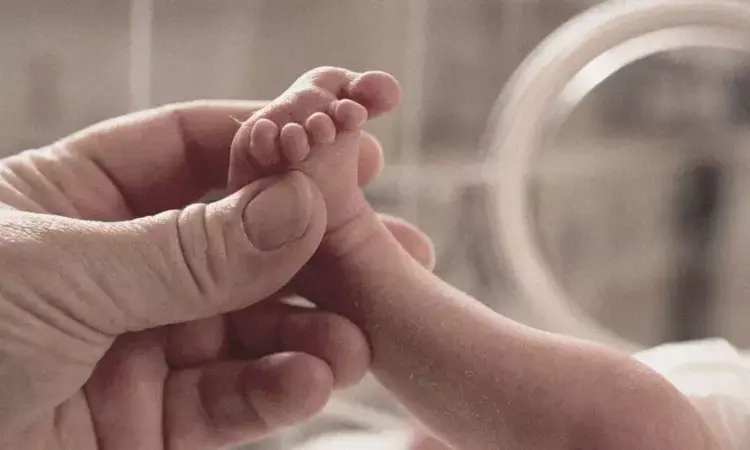- Home
- Medical news & Guidelines
- Anesthesiology
- Cardiology and CTVS
- Critical Care
- Dentistry
- Dermatology
- Diabetes and Endocrinology
- ENT
- Gastroenterology
- Medicine
- Nephrology
- Neurology
- Obstretics-Gynaecology
- Oncology
- Ophthalmology
- Orthopaedics
- Pediatrics-Neonatology
- Psychiatry
- Pulmonology
- Radiology
- Surgery
- Urology
- Laboratory Medicine
- Diet
- Nursing
- Paramedical
- Physiotherapy
- Health news
- Fact Check
- Bone Health Fact Check
- Brain Health Fact Check
- Cancer Related Fact Check
- Child Care Fact Check
- Dental and oral health fact check
- Diabetes and metabolic health fact check
- Diet and Nutrition Fact Check
- Eye and ENT Care Fact Check
- Fitness fact check
- Gut health fact check
- Heart health fact check
- Kidney health fact check
- Medical education fact check
- Men's health fact check
- Respiratory fact check
- Skin and hair care fact check
- Vaccine and Immunization fact check
- Women's health fact check
- AYUSH
- State News
- Andaman and Nicobar Islands
- Andhra Pradesh
- Arunachal Pradesh
- Assam
- Bihar
- Chandigarh
- Chattisgarh
- Dadra and Nagar Haveli
- Daman and Diu
- Delhi
- Goa
- Gujarat
- Haryana
- Himachal Pradesh
- Jammu & Kashmir
- Jharkhand
- Karnataka
- Kerala
- Ladakh
- Lakshadweep
- Madhya Pradesh
- Maharashtra
- Manipur
- Meghalaya
- Mizoram
- Nagaland
- Odisha
- Puducherry
- Punjab
- Rajasthan
- Sikkim
- Tamil Nadu
- Telangana
- Tripura
- Uttar Pradesh
- Uttrakhand
- West Bengal
- Medical Education
- Industry
Study Confirms Safety of 2-Month Vaccinations for Hospitalized Preterm Infants Despite Brief Increased Apnea Risk

USA: A recent randomized clinical trial has shed light on apnea risk in hospitalized preterm infants following routine 2-month vaccinations. The study, published in JAMA Pediatrics, assessed the occurrence of apnea—a temporary cessation of breathing—within 48 hours of vaccination compared to periods without vaccinations.
Researchers found that the likelihood of apnea episodes was notably higher in preterm infants during the 48-hour window following routine 2-month immunizations. Despite this increased risk, the trial revealed no serious adverse effects or substantial changes in the overall number and duration of apneic events associated with vaccinations.
"The comparable frequency and duration of apneic events and the absence of serious adverse effects indicate that existing vaccination guidelines for hospitalized preterm infants remain suitable. Neonatal clinicians are encouraged to offer evidence-based guidance to caregivers, addressing potential postvaccination apnea risks proactively," the researchers wrote.
Preterm infants are typically advised to receive most vaccinations at the same postnatal age as term infants, recognizing the critical role of immunizations in protecting against severe infections. However, studies have shown inconsistent findings regarding an increased risk of postvaccination apnea in this vulnerable group. To address this concern, Rachel G. Greenberg, Duke Clinical Research Institute, Durham, North Carolina, and colleagues conducted a study to compare the proportions of hospitalized preterm infants experiencing apnea and other adverse events within 48 hours of receiving 2-month vaccinations versus periods without vaccinations.
The randomized, open-label clinical trial, conducted at three US neonatal intensive care units from 2018 to 2021, included infants aged 6 to 12 weeks postnatal, born at less than 33 weeks gestation, and eligible for 2-month vaccinations. Participants were randomized into vaccinated (received vaccines within 12 hours) or unvaccinated (no vaccines during the study) groups, with cardiorespiratory data collected for 48 hours post-vaccination or randomization.
The primary outcome was apnea, a respiration pause exceeding 20 or 15 seconds with bradycardia under 80 beats per minute. Secondary outcomes included apnea frequency, duration, and serious adverse events.
The following were the key findings of the study:
- Of 223 randomized infants (117 female; median gestational age, 27.6 weeks), 107 (48%) were vaccinated, and 116 (52%) were unvaccinated.
- Primary outcome data could not be assessed for two infants in the vaccinated group.
- Apnea occurred in 24% of vaccinated infants versus 10% of unvaccinated infants (adjusted odds ratio, 2.70).
- The mean number of apneic episodes did not differ significantly: vaccinated (2.72) versus unvaccinated (2.00).
- The mean duration of apneic episodes also did not differ significantly: vaccinated (27.7 seconds) vs unvaccinated (32.3 seconds).
- There were no serious adverse events during the 48-hour monitoring period.
- Other outcomes showed no significant differences between groups.
The authors found that preterm infants experienced an increased risk of apneic events following vaccination, aligning with prior observational studies and warnings in vaccine package inserts. However, these episodes were brief, there were no serious adverse events during the 48-hour monitoring period and no significant differences between groups in other clinically important outcomes.
"The findings support the current Advisory Committee on Immunization Practices recommendations to vaccinate hospitalized preterm infants at 2 months chronological age, following the same schedule and precautions as for full-term infants. We emphasize the importance of providing evidence-based guidance to caregivers about postvaccination apnea risk," the researchers concluded.
Reference:
Greenberg RG, Rountree W, Staat MA, et al. Apnea After 2-Month Vaccinations in Hospitalized Preterm Infants: A Randomized Clinical Trial. JAMA Pediatr. Published online January 06, 2025. doi:10.1001/jamapediatrics.2024.5311
Dr Kamal Kant Kohli-MBBS, DTCD- a chest specialist with more than 30 years of practice and a flair for writing clinical articles, Dr Kamal Kant Kohli joined Medical Dialogues as a Chief Editor of Medical News. Besides writing articles, as an editor, he proofreads and verifies all the medical content published on Medical Dialogues including those coming from journals, studies,medical conferences,guidelines etc. Email: drkohli@medicaldialogues.in. Contact no. 011-43720751


